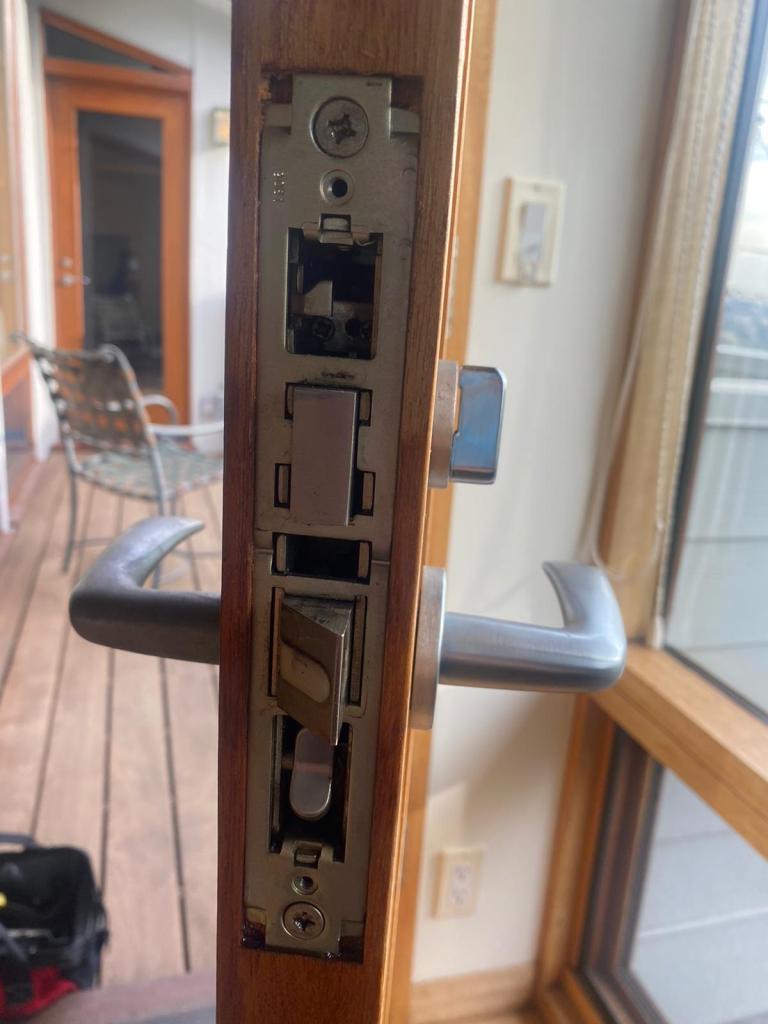In Los Angeles, CA, a client approached Kardo Locksmith about their malfunctioning mortise lock. Our locksmith found the mortise lock was in a state of disrepair, rendered almost useless because of the neglect to lubricate it properly. The mechanism was stuck and lacked fluidity, preventing the door from opening and closing freely. Carefully following the protocol for lock repair, we removed the mortise lock to lubricate the internal locking mechanism. We used WD-40 to clean out rust and applied white lithium grease for added protection. Before closing the job, we thoroughly tested the newly reinforced mortise lock to ensure it worked properly.
Lubricating your locks correctly is important to keep them in good condition. Here at Kardo Locksmith, we get many questions about the best way to do this. The process is similar whether you are lubricating a door lock, a garage door, or a bike lock. By caring for your locks, you can extend their life and feel confident they are working properly.
Why Is It Crucial to Take Care of Locks?
Securing a home should be a primary concern for any homeowner. Statistics show that in the United States, burglars frequently target the front door as a point of entry when attempting to break into a residence. As such, ensuring that all locks and entry points are properly maintained and functioning is essential. That entails checking external door locks annually for signs of wear or tampering. Regardless of where you live, remember that taking the extra step now can lead to lasting peace of mind and safety.
Why Should You Lubricate Locks?
Lubricating locks is important for many reasons. The first reason is exposure to the elements. A lock's worst enemy is water. Rain, snow, frost, and even humidity can all lead to moisture entering your security device. Once moisture gets inside the lock, it can quickly cause corrosion on the internal components. That will make it difficult to open and close or even prevent it from locking. Lubricating your locks creates a barrier that repels moisture and prevents rust.
Lubricating locks prevents wear and tear on moving parts. When these parts repeatedly move against each other, they can start to collect dust, dirt, and other particles. This build-up can cause friction, which leads to the wearing down of parts or them becoming stuck. Lubrication protects the moving parts from friction, reducing wear and tear to extend your lock's lifespan.
How Often Should I Lubricate My Locks?
On average, it is recommended to lubricate door locks at least every six months for maximum benefit. Doing so will prolong the life of the lock, minimize sticking, help with smooth operation, and provide an extra layer of security from potential sticky hands.
Using quality all-weather grease on any exposed pins, bolts, and other opening mechanisms will help maintain smooth operation in extreme temperatures. A lightweight oil such as WD-40 or a graphite-based lubricant should be used when lubricating the lock. Take care not to over-lubricate the lock, as too much lubricant can cause jamming.
Contact a Locksmith Los Angeles
If you are having trouble with your door lock, it is always best to contact a professional locksmith. With their expertise and experience, locksmiths can quickly and efficiently diagnose and repair any issues you have with your door lock. Whether it be a broken mechanism or a lost key, they have the technical know-how and resources to get the job done right. In addition, professional locksmith services usually carry insurance covers against any damage or loss resulting from their work. It is the safest and most cost-effective way to ensure the security of your property and peace of mind.
If you need a reliable locksmith in the Los Angeles area, look no further than Kardo Locksmith. We offer 24/7 emergency locksmith services, lock maintenance and repair, car locksmith services, and commercial locksmith services. Our team of qualified professionals is available anytime to provide dependable locksmith solutions at competitive prices. So do not wait any longer—call now for a free estimate!







Comments: